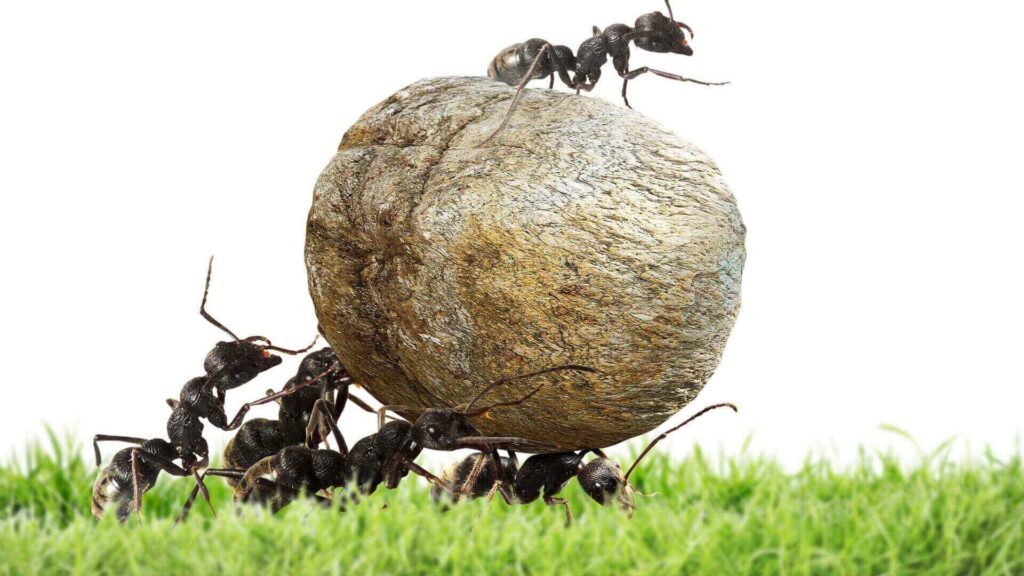
Ants are social insects that live in large colonies with a strict hierarchy and division of labor.
They work together to search for food, care for their young, and defend their colony.
There are over 12,000 species of ants in the world, with varying sizes and colors.
Ants are incredibly strong and can carry objects up to 50 times their own body weight.
Some ant species are known to farm other insects, such as aphids, in order to feed on the sugary secretions they produce.
Ants are an important part of the ecosystem, playing a key role in seed dispersal and soil aeration.
Ants have a lifespan that varies by species, with some living only a few weeks and others living several years.
Ants are found in a variety of habitats, including forests, grasslands, deserts, and urban areas.
Ants are capable of complex behaviors, such as group decision making and self-organization.
Effective ant control often involves a combination of strategies, including baiting, chemical treatments, and eliminating food and water sources.
Ants can have negative impacts on both human health and the environment. Here are some of the major negative impacts of ants:
Health Risks: Ants can carry disease-causing pathogens and bacteria, which can contaminate food and surfaces, posing a risk to human health.
Structural Damage: Certain species of ants, such as carpenter ants, can cause significant damage to wood and other materials in buildings, compromising their structural integrity.
Crop Damage: Some species of ants can damage crops by feeding on seeds and plants, leading to reduced yields and economic losses for farmers.
Ecological Disruption: Ants can disrupt ecosystems by outcompeting native species and altering the behavior of other animals.
Electrical Damage: Certain species of ants, such as fire ants, can damage electrical equipment and cause power outages.
Nuisance: Ants can be a nuisance in homes, gardens, and other areas, as they can quickly infest an area and be difficult to control.
Allergies: Ants can also cause allergic reactions in some people when they come into contact with them, leading to skin rashes and other symptoms.
Garden Damage: Some species of ants can damage gardens by tending to and protecting plant-damaging insects such as aphids and scale insects.
Sting: Certain species of ants, such as fire ants and harvester ants, can deliver painful stings that can cause swelling, itching, and even severe allergic reactions.
Food Contamination: Ants can contaminate food by crawling on it and leaving behind bacteria and pathogens, making it unsafe for consumption.
Here are a few general preventive measures to take to help prevent ants from entering your home:
Cleanliness: Keep your home clean and tidy, wiping down counters and floors regularly.
Seal Entry Points: Seal any cracks, gaps, or holes in walls, doors, and windows that could be used as entry points for ants.
Food Storage: Store food in airtight containers and keep pantry shelves clean and free of crumbs.
Proper Garbage Disposal: Properly dispose of garbage and food waste in sealed containers.
Pet Food: Avoid leaving pet food out for extended periods of time. Instead, place pet food bowls in a shallow dish filled with soapy water to create a barrier that ants cannot cross.
Vinegar and Lemon Juice: Wipe down surfaces with vinegar or lemon juice, which can help deter ants due to their strong scent.
Professional Pest Control: If you have an ant infestation, consider seeking the help of a professional pest control service to eliminate the problem and prevent it from reoccurring.
Are pesky ants invading your space and disrupting your peace of mind? Our ant control services are here to save the day! Our team of experts will assess your situation, identify the ant species, and develop a personalized plan of action to get rid of them for good.
Using the latest techniques and equipment, we will effectively target the ant infestation at its source, ensuring that it doesn’t return. Our team will also provide you with tips and advice on how to prevent future ant infestations, keeping your space pest-free.
We understand that the safety of your home or business is a top priority, which is why we use safe and eco-friendly methods to control ants. Our approach is also pet-friendly, so you don’t have to worry about any harm coming to your furry friends.
Don’t let ants take over your space! Contact us today to schedule a consultation with our ant control experts and take the first step towards a pest-free environment.